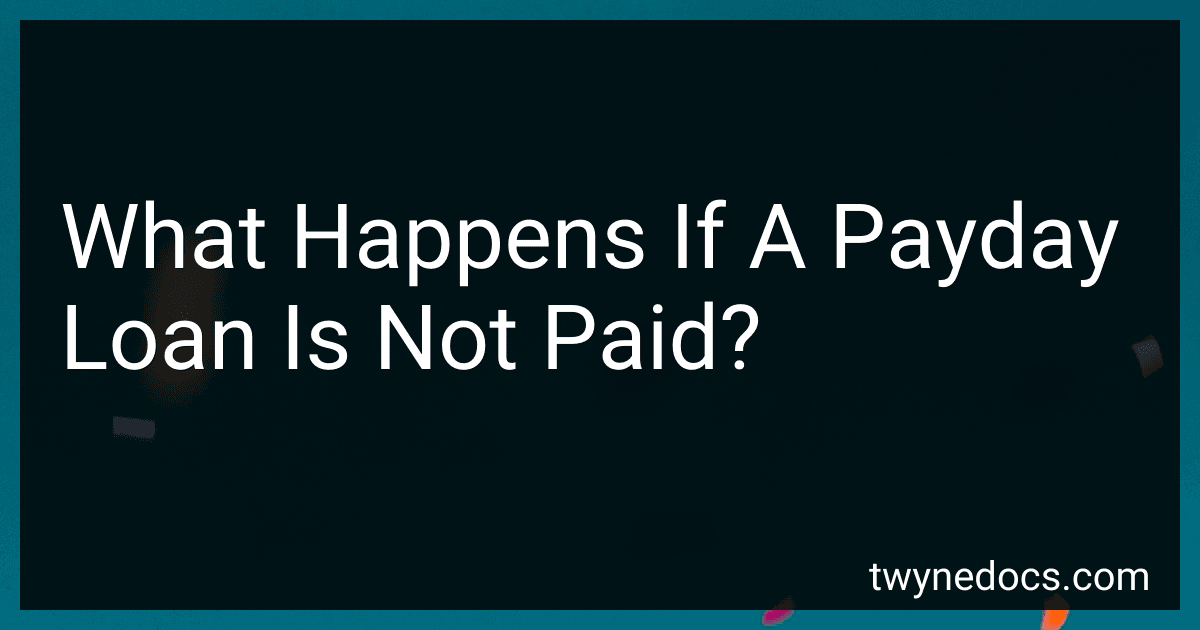If a payday loan is not paid, it can lead to various consequences. Here are some potential outcomes:
- Fees and increased interest rates: Most payday loan agreements include clauses that allow lenders to charge additional fees and higher interest rates if you fail to repay the loan on time. These fees and rates can quickly accumulate, making it even more difficult to repay the loan.
- Collection calls and harassment: Lenders often engage in aggressive collection practices, including incessant phone calls, emails, and letters, to pressure borrowers into repayment. This constant harassment can be stressful and overwhelming.
- Negative impact on credit score: If the payday loan is not paid and the lender reports it to credit reporting agencies, it can have a detrimental effect on your credit score. A lower credit score can make it difficult to secure future loans, credit cards, or even some job opportunities.
- Legal action and court judgments: In some cases, lenders may sue borrowers who fail to repay payday loans. If the lender wins the lawsuit, a court judgment may be issued against the borrower, allowing the lender to garnish wages or seize assets to recover the debt.
- Continual borrowing cycle or debt trap: Some borrowers find themselves trapped in a cycle of borrowing as they struggle to repay the initial payday loan. To cover the debt, they may take out another payday loan, leading to a continuous cycle of borrowing and higher interest rates, which becomes increasingly difficult to escape.
It is essential to fully understand the terms and conditions of a payday loan before taking one, and it's crucial to explore alternative options if you anticipate difficulty in repayment.
Can a payday loan affect my ability to get future loans?
Yes, taking out a payday loan can potentially affect your ability to get future loans. Payday loans are typically considered high-risk loans, given their short-term nature, high interest rates, and lack of credit checks. When you apply for future loans, lenders will assess your creditworthiness, and having a payday loan history may raise concerns about your financial stability, ability to manage debt, and potential reliance on these high-cost loans. This can result in lenders being hesitant to approve your loan application or offering higher interest rates and less favorable terms. It is important to consider the potential long-term impacts before deciding to take out a payday loan.
Can I be arrested for not paying a payday loan?
I am not a legal expert, but I can provide some general information. In most countries, failure to repay a payday loan is not a criminal offense and cannot result in your arrest. However, payday loan regulations may vary between jurisdictions, so it is always best to consult with a legal professional familiar with the laws in your specific location. They will be able to provide accurate and up-to-date advice based on your circumstances.
Can a payday lender take legal action if I'm unable to make payments due to financial hardship?
I'm not a legal expert, but I can try to provide some general information on this topic. It's important to note that laws and regulations regarding payday lending can vary depending on the country and even the specific state or region. In many jurisdictions, payday lenders have the right to take legal action if a borrower fails to make payments as agreed upon in the loan contract. This can include taking the borrower to court in an attempt to recover the amount owed.
However, it's also worth mentioning that some jurisdictions have implemented laws or regulations to protect borrowers from certain practices used by payday lenders. These laws may include caps on interest rates, limits on the number of payday loans that can be taken, or requirements for lenders to assess a borrower's ability to repay the loan before providing the funds.
If you find yourself unable to make payments on a payday loan due to financial hardship, it's generally recommended to contact the lender directly and explain your situation. Some lenders may be willing to work out a repayment plan or negotiate alternative arrangements. Additionally, seeking advice from a consumer protection agency or a legal professional specializing in financial matters can provide you with the best guidance based on your specific circumstances and local regulations.
Can I go to jail for not paying a payday loan?
I am not a legal expert, but I can provide general information on this topic. In most countries, you cannot go to jail simply for not repaying a payday loan. However, payday lenders may take legal action to recover their money, which could potentially result in a judgment against you. If you ignore court orders or fail to comply with legal requirements related to the loan, it could lead to more serious consequences like an arrest warrant or contempt of court. It is important to understand the specific laws and regulations regarding payday loans in your jurisdiction and seek advice from a legal professional if you have concerns or trouble repaying your loan.
What is a payday loan?
A payday loan is a short-term borrowing option where a lender provides a small amount of money (typically up to $1,500) to the borrower, with the understanding that it will be repaid in full on the borrower's next payday. These loans are meant to cover unexpected expenses or emergencies when the borrower is facing a cash shortage. Payday loans usually have high interest rates and fees, making them an expensive form of borrowing. They are typically easy to obtain, requiring minimal documentation and often no credit check, but they can trap borrowers in a cycle of debt if not used responsibly.
